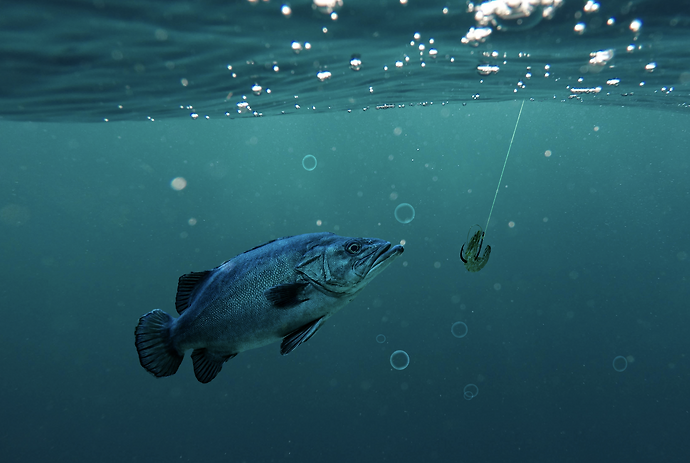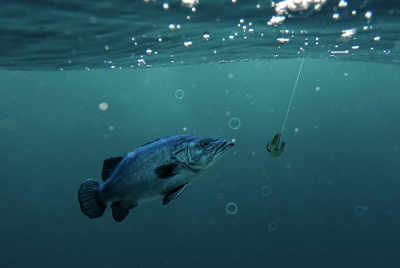Fish wealth represents one of the pillars of food security in the United Arab Emirates, which is why the country works on its development by following the best sustainable fishing practices and preventing illegal fishing. This aims to preserve the marine environment and regulate the optimal utilization of fish wealth. In this regard, the state has launched numerous programs, systems, and initiatives that have contributed to rehabilitating marine habitats, enhancing fish stocks, preserving marine resources, and managing marine and coastal ecosystems sustainably.
The objectives of sustainable fishing align with the "Champions of Marine Life" theme under the recently launched "National Sustainability" campaign, coinciding with preparations for the UN Climate Change Conference "COP28," which will be held from November 30 to December 12 this year in Expo Dubai. This theme highlights national success stories in the field of marine life sustainability. The campaign aims to "raise awareness about environmental sustainability issues, encourage community participation, and support national strategies related to climate action, resulting in a community that is environmentally aware."
### Sustainable Fisheries
The Ministry of Climate Change and Environment, in partnership with the Environment Agency - Abu Dhabi, launched the Sustainable Fisheries Program for the UAE, which was implemented from 2016 to 2018. This program achieved several outputs, including a fish stock survey to protect and sustain fish wealth. The ministry, in collaboration with the agency, also established the National Framework for Sustainable Fisheries in the UAE 2019 - 2030, based on the results of the state’s sustainable fisheries program as part of comprehensive efforts by government entities to protect and sustain marine resources.
The framework aims to "increase sustainable fish stocks in the country to 70% by 2030, reduce the impacts of overfishing on the marine environment, and promote environmentally sustainable, economically viable, and socially responsible fisheries." It has also set a national plan to revitalize and renew fish stocks in the country.
### Fish Farming
Fish farming, which focuses on breeding species of fish and providing suitable conditions for their reproduction and growth to enhance fish production, is receiving increased attention in the UAE due to its essential role in enhancing food security. The Ministry of Climate Change and Environment is preparing national programs to enhance the productivity of registered aquaculture farms. It seeks to attract investment in this domain through technical guidance to enhance capacities and research identifying certain species suitable for farming based on the UAE's environmental and climatic conditions, including shrimp and some local economic fish species such as hammour, snapper, as well as non-local species like supreme fish and sea bass.
In 2019, the "Sustainable Aquaculture Policy for Abu Dhabi" was launched, aiming to establish a unified vision for the aquaculture sector in the emirate, alongside a series of shared principles and guidelines to develop a sustainable aquaculture sector. In line with this vision, the Environment Agency - Abu Dhabi identified suitable locations in the waters of the Al Dhafra region, specifically around Delma Island and the waters of Dubai, to establish sustainable aquaculture projects using marine cages. The agency is also creating a pilot project for farming local, economically important fish using marine cage systems in Delma Island.
To preserve the marine biodiversity, the UAE issued the national plan for the conservation and management of sharks in the country 2018 – 2021, and the national plan for the conservation of sea turtles in the country 2019 – 2021.
### Quality Initiatives
The Environment Agency - Abu Dhabi implements several measures and initiatives to enhance fish stocks and the marine environment, including creating artificial reefs, marine protected areas, restoring natural coral reefs, conducting research studies related to fish stocks, and programs for releasing fish fingerlings for rehabilitation, alongside developing the aquaculture sector in the emirate.
The agency is working to maintain and rehabilitate the coastal and marine environment to be recognized among the United Nations Environment Programme's top ten global initiatives for restoring and rehabilitating ecosystems. The Environment Agency - Abu Dhabi has recorded a noticeable improvement for the fourth consecutive year in the "Sustainable Fishing Index," which rose from 8.9% in 2018 to 69.1% at the end of last year, calculated based on an assessment of 35 fish species representing 97% of landings in 2022.
Since 2001, the agency has monitored the state of fish stocks using two main sustainability indicators: the "Sustainable Species Index" (SBR), which determines the stock size of adult fish compared to the biomass of unexploited fish species, and the "Sustainable Fishing Index," which describes the percentage of species exploited sustainably from the total catch.
The fish laboratory at the Environment Agency - Abu Dhabi supports ongoing studies to assess the status of fish stocks in Abu Dhabi for sustainable fisheries management by studying the reproductive biology of commercially important fish species, evaluating their growth stages and breeding seasons through laboratory tests and analyses of gonads to determine growth stages and breeding periods, as well as examining otoliths to estimate ages.
In 2023, the Environment Agency - Abu Dhabi issued a regulation for recreational fishing in Abu Dhabi aimed at supporting recreational fishing activities and enhancing marine fishing sports in the emirate through regulation of recreational fishing practices and competitions in the waters of Abu Dhabi to ensure the sustainability of fish resources.
The agency announced that the "Gion" vessel, launched in 2023 and regarded as the first and most advanced technically in the region, has completed the first comprehensive acoustic survey of fish resources in the waters of the country in the Arabian Gulf and Oman Sea. Through data analysis, the agency will be able to determine the size, density, and location of fish populations, which will help evaluate the health and status of fish stocks in the region and contribute to sustainable fisheries management efforts.
### Mangroves and Coral Reefs
The UAE has notably focused on mangroves due to their role in carbon emission storage and providing safe habitats for fish and marine life, in addition to their vital role in protecting coastal areas from erosion caused by waves, currents, and human activities. The Environment Agency - Abu Dhabi successfully planted one million mangrove seeds using drones as part of the innovative mangrove tree planting project, the first of its kind in the region, recognized by the World Economic Forum among 12 innovative projects in blue carbon.
The Abu Dhabi Mangrove Initiative, announced in February 2022, includes ambitious plans to solidify the emirate's position as a global hub for research and innovation in mangrove conservation, emphasizing the importance of mangroves in carbon sequestration and mitigating climate change impacts, with the agency implementing the initiative in collaboration with various local, regional, and international partners.
Coral reefs represent one of the main components of the marine environment; therefore, the Ministry of Climate Change and Environment worked, in coordination with all concerned entities at the national level, to establish a legislative framework ensuring the protection of coral reefs for their sustainability. The ministry executed a research project for breeding 24 species of coral along the state's coasts, focusing on developing their abilities to adapt to climate change impacts. Additionally, a geographic distribution map of coral reefs was prepared along the state's coastline, with 210 sites monitored and over 55 species of hard corals recorded.
The Environment Agency - Abu Dhabi launched the largest coral reef rehabilitation project in the region, including the cultivation of over one million coral colonies, having fixed and rehabilitated 350,000 colonies in the emirate's waters. Through this project, four coral nurseries were developed to help mitigate the negative impacts of natural pressures on coral reefs due to climate change and rising seabed temperatures, contributing to increasing coral coverage and rehabilitating affected areas to maintain the significant heritage, economic, and scientific value of coral reefs.




